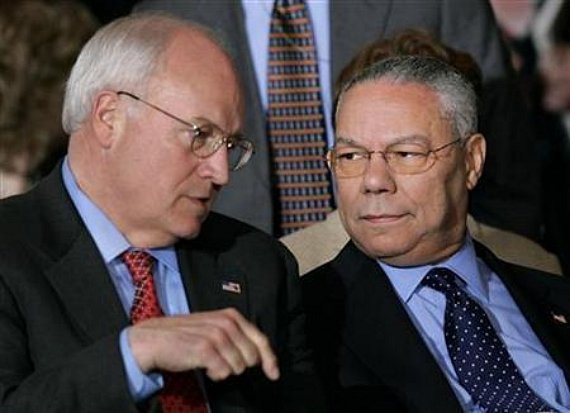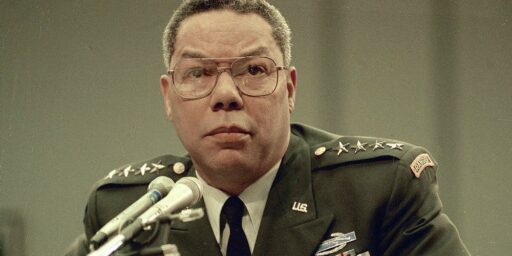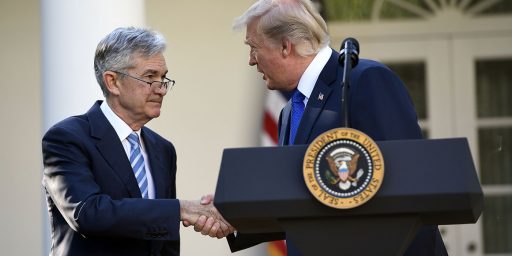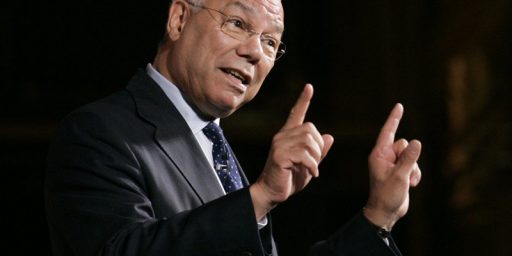Colin Powell Shoots Back At Dick Cheney Over Book
Back during the days of the George H.W. Bush Administration, Colin Powell and Dick Cheney were colleagues. Cheney was Secretary of Defense and Powell as Chairman of the Joint Chiefs of Staff and, along with President Bush, they successfully guided the United States through its largest military engagement since the end of the Vietnam War. Something changed along the way, though, and by the time the two served together in the second Bush Administration the relationship was quite different, a fact that Cheney made quite apparent in his upcoming book:
Just as reporters and former administration insiders have noted that dissenting opinions tended to be unwelcome in the Bush White House, so Mr. Cheney demonstrates here a distinct antipathy toward people who opposed him on matters of policy. Colin L. Powell — who clashed with Mr. Cheney over Iraq and who was characterized in one of Bob Woodward’s books as thinking that “Cheney took intelligence and converted uncertainty and ambiguity into fact” — is repeatedly dissed in this volume. Mr. Cheney says he “thought it was for the best” that President Bush had accepted Mr. Powell’s resignation as secretary of state in 2004; he says that Mr. Powell handled policy differences not by voicing objections in meetings, but “by criticizing administration policy to people outside the government.”
Powell shot back yesterday in an appearance on Face The Nation:
Former Secretary of State Colin Powell said Sunday that former Vice President Dick Cheney took “cheap shots” in his forthcoming memoir, and that he was taking his aggressive promotional techniques “a bit too far.”
Powell, speaking on CBS’ “Face the Nation,” targeted Cheney’s claim that the book, “In My Time,” would “make heads explode.”
“My head isn’t exploding, I haven’t noticed any other heads exploding in Washington, D.C.,” Powell pointed out. “From what I’ve read in the newspapers and seen on television it’s essentially a rehash of events of seven or eight years ago.”
In fact, Powell suggested, the most notable thing about the book was Mr. Cheney’s characterization of it.
“What really sort of got my attention was this way in which he characterized it: it’s going to cause heads to explode,” he said. “That’s quite a visual. And in fact, it’s the kind of headline I would expect to come out of a gossip columnist, or the kind of headline you might see one of the supermarket tabloids write. It’s not the kind of headline I would have expected to come from a former Vice President of the United States of America.”
He added: “I think Dick overshot the runway.”
Powell also took issue with Cheney’s claim that, during his tenure as Secretary of State, he declined to fully present his positions to former President George W. Bush.
“Mr. Cheney may forget that I’m the one who said to President Bush, ‘If you break it you own it,'” Powell said, referencing the administration’s actions in Iraq. “I gave the president my best advice.”
(…)
Powell implied that Cheney’s characterizations in the book are a reflection of what was at the time a dysfunctional White House.
“I’m not going to attribute any emotion to Mr. Cheney in the writing of his book, but it was clear in 2004 that the team wasn’t functioning as a team,” Powell said. “It was not a smoothly functioning team at that point. … I felt that I had to leave the administration. And frankly, I always intended to just serve one term.”
One possible explanation for Cheney’s relentlessness in attacking the State Department in his book (he also goes after Condi Rice) may lie in the fact that Cheney was close friends with Donald Rumsfeld, and sided with him in most of the disputes between Defense and State over the Iraq War. In any case, if this book is any indication, it would seem clear that Cheney still refuses to admit that he made even a single mistake during his time as Vice-President. Which is perhaps his greatest failing.







Cheney’s book makes clear the utter uselessness of gathering intelligence. We’ve seen over and over again the White House gang (regardless of who is in office) accepting information which confirms their biases and rejecting the data that do not. This isn’t limited to the Bush administration, although it was the most egregious case since Nixon. We might as well throw darts to determine how best to proceed in foreign policy.
I think it’s funny that Powell’s mild comments are so “over hyped” (to borrow a hurricane meme).
Hey Dick, you and Rummy need to fade into the sunset and shut the f$%! up while we deal with the aftermath that you and your ilk left us in lovely places like Iraq and Afghanistan. Wherever people like Rummy, Bremer and the other geniuses like them are – go there, be quiet. Your time is up. You screwed up. Deal with it.
Moral of the story: Right or wrong, it doesn’t help to alienate the one man who can save everyone the trouble of a two-year investigation.
As to Cheney and Powell and how they work together I gather its never been very smooth. Back when Cheney was Sec of Defense he had to give Powell a few swift kicks to the a$$ during the run up to Desert Storm. Powell was willing to let everybody sit in the desert for 6+ months and wait for sanctions to ‘work’.
I always thought Powell was a bit of a George McClellan in that he’s smart and brave but just can’t stomach some of the ‘risk’ factor that goes with being a great general. A McClellan quote seems to almost be lifted from Powell’s ‘rules’: “It has always been my opinion that the true course in conducting military operations, is to make no movement until the preparations are as complete as circumstances permit, & never to fight a battle without some definite object worth the probable loss.” There are times you just have to roll the dice and go with it.
@tps:
The trouble with that analogy is that McClellan was consistently wrong (wildly wrong) about opposition strength, and consistently refused to fight based on that. He was always whining to Lincoln that he was outnumbered. We now know that his estimates were consistently double the actual Confed strength.
McClellan’s fears were overblown. Powell’s were not.
That matters.
Also, seriously, waiting in desert for 6+ months is somehow worse than fighting a totally unecessary war that cost ~5k of our troops lives, more wounded, and staggering Iraqi casualties? Feh.
@Rob in CT: depends on how you define “worse” or cost – to a guy like Cheney it is not lives it is or injuries — he is a big picture guy —– he doesn’t have anything at stake – never did
@mike: Therein lies the problem. Defense policy was being determined by someone who in his youth, “had more important things to do [than serve in the military].” He has no concern over the consequences of his decisions.
As Churchill has been attributed to have said, “if the men who start the wars would go themselves instead of sending their sons, the wars would be a damnsight shorter.”
@tps: Vietnam’s lesson was that if you go into war, you better have two things: a plan to win, a plan to get out. You would think our leaders would have learned that.
Concerning General “Little” Mac; he always seemed to want perfect conditions, to wait and see; a “chessboard” type of general. It took Grant, who realized what it would take to win, to dictate the battle. I have always felt if that General Sherman dude had not come down here and tore everything up, we would have won that war.
Served 26 years as enlisted, with duties as supervisor, enlisted detachment commander, supply officer, intelligence, avionics, with highest security clearance in intelligence and communications fields. During those years, I attended many staff meetings held by Commanders up to rank of Major General. I learned what finished staff work was, and I also learned about defending that work in staff meetings. Obviously if any who have commented so far ever served, it was not in position to learn or know this. General Colin Powell cannot be commended too highly for service in Army, rising to top rank on ability and not affirmative action. VP Dick Cheney held many positions in U.S. Government, and his service could not have been improved by serving in military. President George W. Bush did not serve in military, and also advanced by own abilities and talents, and I personally approved his method of conducting U.S. government. Colin Powell as Secretary of State, and Condi Rice as National Security Advisor – later as Secretary of State did not serve Country or President Bush as well as they should have. Donald Rumsfeld knew how and selected the Generals to conduct wars that knew how to win the war (buildup strength, mass equipment and material, and the military to use it), and they did win the wars. Secretary of State selecting Bremer and giving him free hand, delayed winning the peace and led directly to the buildup of vandalizing, destruction, and much hard fighting to take back country for the terrorists who came from all over the world. Even some american born jihadists. Bremer presided over Iraqi army deserting, declaring they were not needed. Condi Rice depended too much on committee action, which works in academic world. Not on battlefield or in country where battle is still going on. I felt that throughout war in Iraq, Afghanistan (and lapover in Pakistan), and I don’t see Libya as well managed either. Just my opinion at age 82, retiring as senior NCO. I supervised my work sections and projects throughout my service years, and with permission of my senior officers, contacted major commands, Navy, Air Force, Canadian officials in Avionics and Satellite Communications. Kept superiors advised of actions, and I do not feel that Powell or Rice came to defense of President Bush, when media and Americans were fed only one side of issues. Read Rumsfeld’s book, Franks Book, and then recheck your thinking.